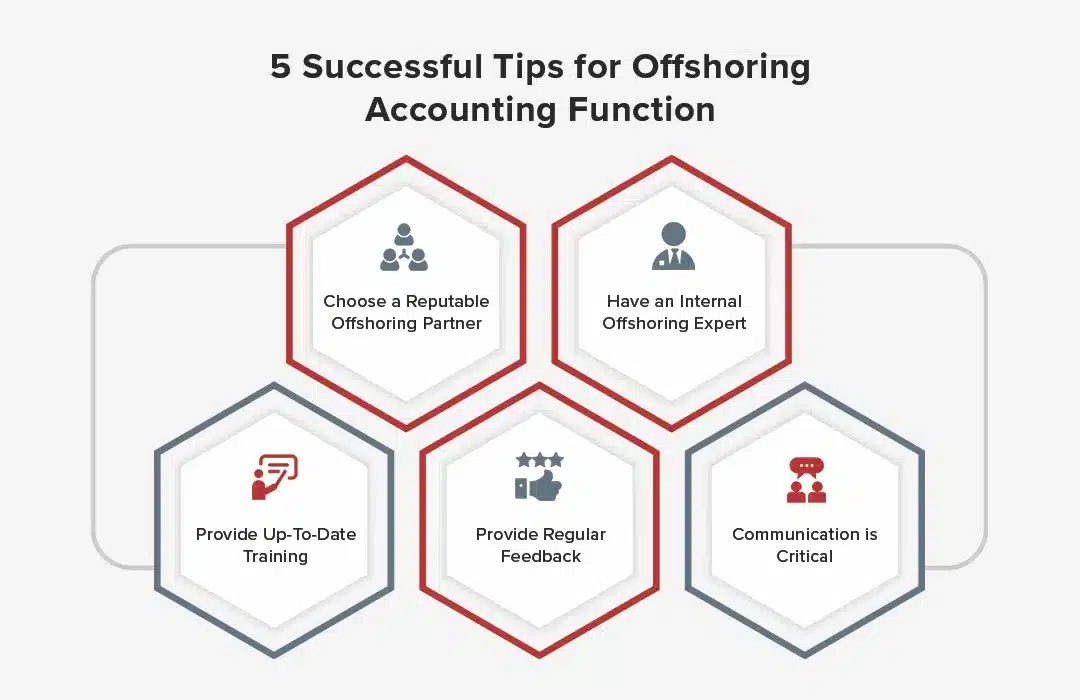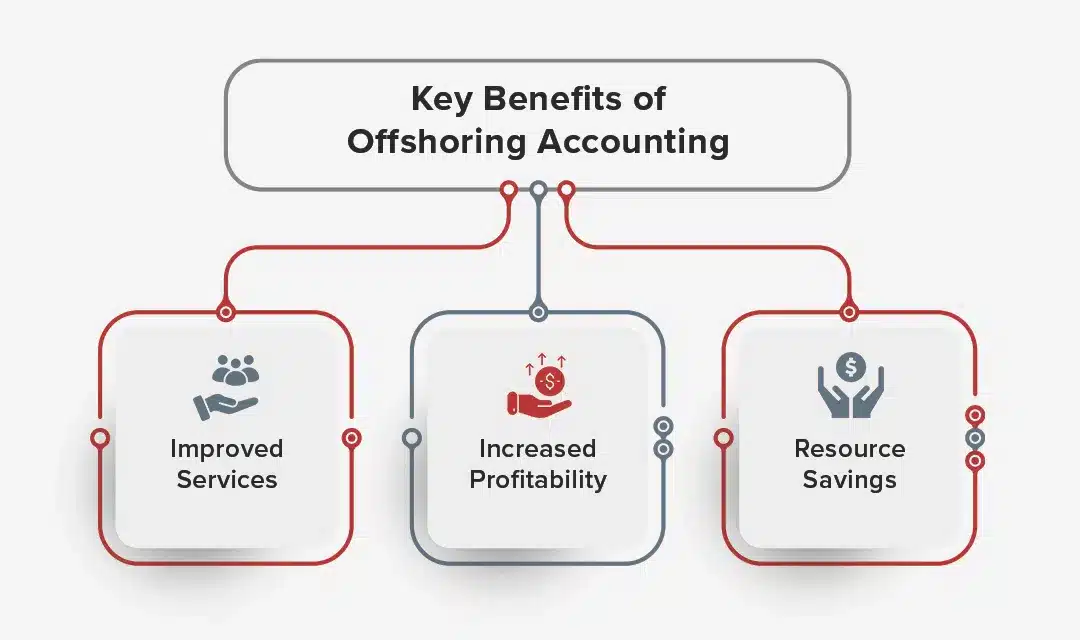Over the last decade, the accounting function across industries has seen notable increases in staff compensation levels and almost stagnant growth in revenue from accounting and tax services. This impacted the bottom line, compounded with the scarcity of recruits, the erosion of firm loyalty. To manage sustainable growth and strike a work life balance, many traditional CPA firms turned to offshoring. The recent past has taught us that an individual can be a productive team member while working from anywhere – in the office, across the street, in another city, and, in fact, in another country. This has opened up new opportunities to offshore accounting across the world.
When looking at offshoring, specifically in the accounting and finance industries, several factors contribute to the project’s success. For this reason, enterprises have started considering offshoring as an out-of-the-box yet beneficial alternative to the in-house accounting function. It can yield short-term business gains and could open up new avenues for business growth.
Table of Contents
What is Offshoring Accounting?
Outsourcing single or multiple accounting functions to a third-party service provider is known as offshoring accounting. Offshoring refers to a method of outsourcing practice where your service provider is situated far away from your geographical location or in another country.
For any given firm, accounting forms an essential aspect of their everyday operations including maintaining accurate records, managing budgets, and ensuring legal obligations. While some companies manage their accounting tasks independently, many opt to engage an overseas team for offshoring accounting.
Here are a few of the many accounting activities that can be easily outsourced:
- Accounts receivable and payable
- Tax preparation and filing
- Bookkeeping
- Payroll management
- Inventory management
If you, as a business, are considering to offshore accounting as an alternative to your in-house accounting function, here are some tips that can help you make your decision.
Tips for Offshoring Accounting Function That Can Help You Make Your Decision

1. Choose a Reputable Offshoring Partner
Once you have decided to engage an offshoring partner, you must ensure that the offshoring partner has a proven track record in the specialized service you require. As a business, you must do your due diligence—one of the easier ways to confirm that the offshore provider is both SOX-compliant and GDPR-conforming. You must also ask for references and recommendations and gain knowledge of the partner and the specific team you will be working with. Because you will be dealing with sensitive data, confidentiality and data privacy should be your utmost priority. You must have proper checks in place to ensure that your business reputation is not harmed in any way. Choose your offshore accounting provider with great care.
2. Have an Internal Offshoring Expert
An internal offshoring expert could be a key stakeholder in your business endeavor. The expert should be actively engaged and be able to connect with the team to realize the many advantages of offshoring. They should delve deeply into existing firm processes and projects and, using their internal influence, bring to light any task that can or should be offshored. As an internal expert, the individual sees the value of using offshoring and actively promotes the services to the point where others in the firm see the benefits and look to their effective use of offshore staff as a roadmap for their success. When resistance is met, which is natural the internal expert must have the executive communication skills to explain the “why” and guide others to embrace the change.
3. Provide Up-To-Date Training
Everyone in the accounting and taxation field knows that you learn something new every day. That is why it is such a great profession. From tax changes to handbook updates, from software glitches and fixes to new internal processes, each day brings something new and improved – which is precisely why accounting is such an exciting career! Professional offshored staff are also eager to learn about the latest tax changes, key trends, and new ways. Whether it be new year-end templates and checklists, converting financials to new standards, or getting deep into tax changes, the hunger for knowledge is unquenchable. Keep your offshore accounting team engaged by including them in your internal training sessions, either on-demand via recorded sessions or in real-time. Invest in your offshore teams, and they will pay dividends!
4. Provide Regular Feedback
You can’t change what you don’t know. If no feedback is given, there is no chance of improvement. Continuous improvement is essential in the accounting profession. Communicate feedback regularly to the offshore team. The feedback given could either be formal or ad hoc depending on the scope of the issue. It will also ensure that you are constantly in touch with the offshore staff and are actively communicating with them. As with a direct team, consistent feedback creates growth and fluid communication opportunities. Feedback is also key to resolving problems and has the potential to generate solutions that not only help the offshore team but are scalable firmwide.
5. Communication is Critical
One of the major take-aways from the last two years is that strong staff engagement requires superior internal communication. Most accounting staff have been either working fully remote or in a hybrid work environment. For firms that outperformed their competition in successfully retaining staff across multiple work environments, the method and timeliness of communication were the key factors. Firms should consider the offshore members an integral part of the accounting and finance team. Conversations on timelines, pipelines, changes, and improvements should occur regularly. The ability to video call and screen share, which many had not experienced before the pandemic, enables real-time collaboration between the offshore and onshore teams. It is amazing what new insights, ideas, and creations occur when communication flows freely across all stakeholders.
Offshoring your accounting processes to professionals from another country can bring the following benefits to your organization:
Key Benefits of Offshoring Accounting

1. Improved services
Since offshore accounting firms focus primarily on accounting services, their teams will ensure high-quality services since they have extensive knowledge in the field.
By offshoring accounting functions to a third-party service provider, you need not execute time-consuming tasks such as bookkeeping, financial reporting, auditing, tax compliance, etc.
2. Increased Profitability
By offshoring accounting, you can save the cost of paying your in-house employees and their transport costs or sick pay allowances.
3. Resource Savings
Hiring and onboarding is a time-consuming process involving putting out job ads, conducting interviews, coordinating with other departments, organizing orientation, etc. This results in the delay of other priority tasks with strict deadlines from the client.
Outsourcing accounting functions can help you save your hiring or training efforts since your offshoring team will handle your accounting needs.
If you don’t want to go all in, you can always start by offshoring the tasks that are your Achilles’ heel. Once you’ve established a comfortable style of working with your offshore partner, you can outsource the other accounting services too. This cost-effective strategy can help businesses scale up and down with ease.
To Sum Things Up
In the current economic scenario, businesses of all sizes are taking a second look at offshoring to mitigate escalating costs and fill staff vacancies. The true benefit is to see when internal resources are freed from compliance-driven tasks and have the time to focus on client enabling and advisory roles. Accounting professionals want to impact their client’s businesses and be invaluable partners in their client’s success. Transitioning staff from compliance-driven tasks to business advisory roles takes knowledge, time, and commitment. Offshoring provides coverage as CPA firms transition into the future.
Suppose you, as a business, are looking to explore offshoring as an alternative to your accounting tasks. In that case, we will be happy to walk you through our services and demonstrate our services/solutions can help you streamline your accounting function.
